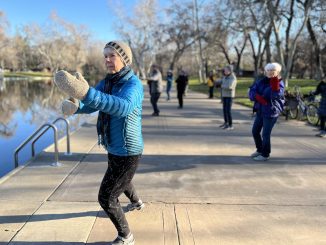
For all of my life, I’ve been what folks back home in Georgia called a “yellow dog Democrat.” That is, I would vote for a yellow dog so long as it was a Democrat. Now retired and living in Chico, I still am a Democrat and also own a yellow dog.
As if the recent election were not stimulating enough, I now find myself having imaginary conversations with Republicans. That seems a better choice than real conversations given the current mood of our body politic. Here is an example: I meet a woman in the parking lot at Winco who has “stop the steal” painted on her car and is wearing a “Trump forever” T-shirt. I say, “Here, let me take your cart. After all, now that the election is over, we’re all in this together, right?” And she replies, “Sure, after all, this is America and we’re all for one and one for all.” Of course, she has no way of knowing I voted for the other guy. If she did, the conversation might go differently. She might say, “Lock him up! And lock you up, too!” as she rams my car with her shopping cart.
My neighbor is a fellow Southerner who has Trump and Pence banners in her garage. We’ve never talked about politics and probably never will. Instead, we compare recipes, remember things like rain and humidity, and watch our dogs play together. The dogs have yet to vote, and if they were to vote, it would probably be based on whose butt smells best. Kind of like people, now that I think of it.
Occasionally, I imagine talks with fellow Biden supporters. I bring up those who voted in the other direction and suggest that we all have to work together. “I don’t see how,” one imaginary friend says. “Really, I don’t even know where to begin.” My mind replies, “You might start by wiping that smug smile off your face and stop being afraid of people who disagree with you.”
No, wait. There has to be a better way, even if I am just talking to myself. Dr. Len Matheson, a peer leader at Chico State’s Osher Lifelong Learning Institute (OLLI), teaches a class about how the brain works. He reminds us that when we talk with each other, we provide visual and verbal cues that create an emotional response. Dr. Matheson explained that we can increase the negativity associated with a bad experience by saying things like, “Oh, that’s terrible! I can’t believe that happened to you!” Instead, he suggests a focus on resilience by reminding people who have experienced a loss how grateful we are that they made it through a troublesome experience.
I think I will use this idea to reframe my imaginary conversations. And, since most of these conversations are with myself, I’ll start with me. Using Dr. Matheson’s suggestion, I’ll first congratulate myself on having survived the pain and chagrin of the Trump presidency and my attendant inner dialog. With that behind me, I’ll be ready to greet the rest of the world (Democrats and Republicans alike) with a genuine appreciation of what everyone has to offer, regardless of how they voted and how the election turned out. And I will then go for a long, long walk with my favorite yellow dog.
The author is a retired University of Georgia faculty member who moved to Chico in 2018 to be near her grandchildren.


Thank you Janet in a great “open our eyes and hearts some more” critique vs wisdom of SOCIETY in MANY, MANY WAYS !! I have been a part of this DISGUST in this REPUBLICAN/TRUMP/CHURCH CONSPIRACY of AMERICA”S VALUES !!?? It’s openned my heart MORE to my neighbors of color, emigrants, have-nots, embarrassed for their language skills and ? who they are. They, as I have, and so many others, have been DEMONIZED WAY TO LONG !! My head and EGO have been in the way- to often in my 50 years of thoughtfulness to reject my heart and soul, ANY MORE . thanks again